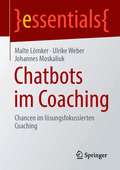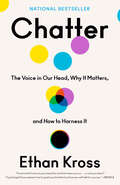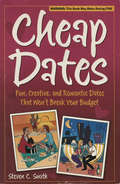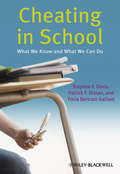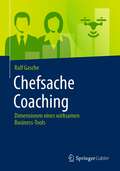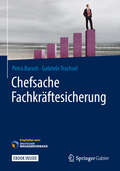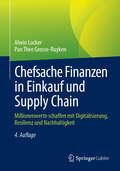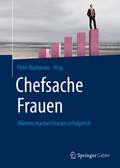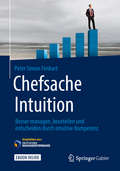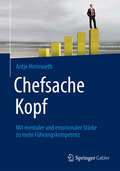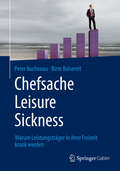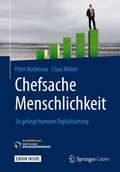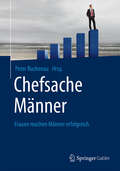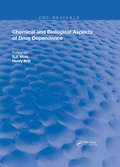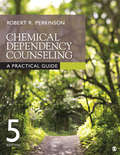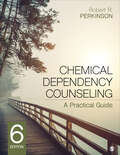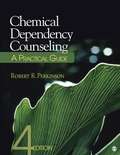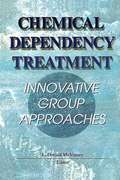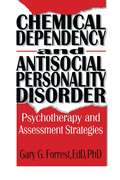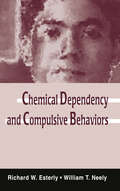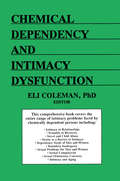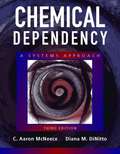- Table View
- List View
Chatbots im Coaching: Chancen im lösungs-fokussierten Coaching (essentials)
by Johannes Moskaliuk Ulrike Weber Malte LömkerDieses essential gibt einen fundierten Einblick in die Einsatzmöglichkeiten von Chatbots im lösungsfokussierten Coaching. Es zeigt die Einsatzmöglichkeiten von Chatbots auf, besonders die weniger bekannten im Gesundheitssektor, skizziert deren Möglichkeiten und Grenzen und diskutiert ihre Weiterentwicklung. Basierend auf wissenschaftlich bestätigten Erfolgsfaktoren für Coaching und dem Konzept des lösungsfokussierten Coachings erläutert das essential anschaulich die Umsetzung von Coaching-Prozessen in die „Denkweise und Sprache“ von Chatbots. Als Ausblick diskutiert das essential das Verhältnis Mensch zu Maschine, und wie Chatbots unser jetziges Verständnis von Coaching nachhaltig verändern und bereichern können.
Chatter: The Voice in Our Head, Why It Matters, and How to Harness It
by Ethan KrossNATIONAL BESTSELLER • An award-winning psychologist reveals the hidden power of our inner voice and shows how to harness it to combat anxiety, improve physical and mental health, and deepen our relationships with others.LONGLISTED FOR THE PORCHLIGHT BUSINESS BOOK AWARD • &“A masterpiece.&”—Angela Duckworth, bestselling author of Grit • Malcolm Gladwell, Susan Cain, Adam Grant, and Daniel H. Pink&’s Next Big Idea Club Winter 2021 Winning SelectionOne of the best new books of the year—The Washington Post, BBC, USA Today, CNN Underscored, Shape, Behavioral Scientist, PopSugar • Kirkus Reviews, Publishers Weekly, and Shelf Awareness starred reviewsIs talking to yourself normal? The truth is that we all have a voice in our head. When we talk to ourselves, we often hope to tap into our inner coach but find our inner critic instead. When we&’re facing a tough task, our inner coach can buoy us up: Focus—you can do this. But, just as often, our inner critic sinks us entirely: I&’m going to fail. They&’ll all laugh at me. What&’s the use? In Chatter, acclaimed psychologist Ethan Kross explores the silent conversations we have with ourselves. Interweaving groundbreaking behavioral and brain research from his own lab with real-world case studies—from a pitcher who forgets how to pitch, to a Harvard undergrad negotiating her double life as a spy—Kross explains how these conversations shape our lives, work, and relationships. He warns that giving in to negative and disorienting self-talk—what he calls &“chatter&”—can tank our health, sink our moods, strain our social connections, and cause us to fold under pressure. But the good news is that we&’re already equipped with the tools we need to make our inner voice work in our favor. These tools are often hidden in plain sight—in the words we use to think about ourselves, the technologies we embrace, the diaries we keep in our drawers, the conversations we have with our loved ones, and the cultures we create in our schools and workplaces. Brilliantly argued, expertly researched, and filled with compelling stories, Chatter gives us the power to change the most important conversation we have each day: the one we have with ourselves.
Cheap Dates: Fun, Creative, and Romantic Dates That Won't Break Your
by Steven C. SmithGreat Dates, FUN Dates — for Less! Let's face it: Coming up with a creative yet affordable night out can be a challenge. But thereareways to put a charge in your dating life without putting a big charge on your credit card. If you're looking for entertaining, adventurous, or just plain fun dating ideas that won't break the bank, this refreshing guide is your ideal companion. Steve Smith's Top 3 Cheap Dates: 3. Sidewalk Cafe Date — What sets this date apart from any ordinary lunch date is that this Cafe's location is truly on a sidewalk—outside your own residence! Surprise your date with a bistro for two complete with a cozy table, centerpiece, menu, food cart and your own server (ask a friend for help). This lunch is sure to win a rave review from your date. 2. Dazzling Dessert Date — Surprise your date with a post-dinner scavenger hunt that leads to a fun location for a creative dessert. Once your date has collected all the clues and found your hiding spot, impress your date with a wonderful gourmet dessert that you have prepared-- a sweet ending to a delightful evening! 1. Your Lucky Day Date — Add a little flair with this date! Prior to picking up your date go to each place that you will be taking him or her and pay in advance. As the evening unfolds, enjoy the surprised look on your date's face when, time after time, the two of you become the winner of "free" dinners, "free" movie passes, and so on. Have an employee greet you and your date with the "good news" such as "Congratulations, this is your lucky day! You have just won a free dinner. " Whether you are a young adult looking for new ideas for fun, a married couple looking for some spark, or someone new to the dating scene, inside is everything from energizing first dates to sizzling romantic dates-and each is a date to remember. ·Fun and frugal dates ·Romantic dates ·Sport and leisure dates ·Outdoor dates ·Splurge dates
Cheating in School: What We Know and What We Can Do
by Stephen F. Davis Tricia Bertram Gallant Patrick F. DrinanCheating in School is the first book to present the research on cheating in a clear and accessible way and provide practical advice and insights for educators, school administrators, and the average lay person. Defines the problems surrounding cheating in schools and proposes solutions that can be applied in all educational settings, from elementary schools to post-secondary institutions Addresses pressing questions such as “Why shouldn’t students cheat if it gets them good grades?” and “What are parents, teachers, businesses, and the government doing to unintentionally persuade today’s student to cheat their way through school?” Describes short and long term deterrents that educators can use to foster academic integrity and make honesty more profitable than cheating Outlines tactics and strategies for educators, administrators, school boards, and parents to advance a new movement of academic integrity instead of dishonesty
Cheating, Corruption, and Concealment
by van Prooijen, Jan-Willem and van Lange, Paul A. M. van Prooijen, Jan-Willem van Lange, Paul A. M.Dishonesty is ubiquitous in our world. The news is frequently filled with high-profile cases of corporate fraud, large-scale corruption, lying politicians, and the hypocrisy of public figures. On a smaller scale, ordinary people often cheat, lie, misreport their taxes, and mislead others in their daily life. Despite such prevalence of cheating, corruption, and concealment, people typically consider themselves to be honest, and often believe themselves to be more moral than most others. This book aims to resolve this paradox by addressing the question of why people are dishonest all too often. What motivates dishonesty, and how are people able to perceive themselves as moral despite their dishonest behaviour? What personality and interpersonal factors make dishonesty more likely? And what can be done to recognize and reduce dishonesty? This is a fascinating overview of state-of-the-art research on dishonesty, with prominent scholars offering their views to clarify the roots of dishonesty.
Chefsache Coaching: Dimensionen eines wirksamen Business-Tools (Chefsache)
by Ralf GascheDieses Buch stellt professionelles Business-Coaching als wichtiges Erfolgskriterium für Unternehmen und Führungskräfte in den Blickpunkt. Ralf Gasche bespricht nicht nur ein beiläufiges Phänomen, sondern präsentiert eines der wirksamsten Weiterentwicklungstools der letzten Jahrzehnte, wenn nicht sogar des letzten Jahrhunderts. Dabei stellt er alle wesentlichen Wirkfaktoren sowie die entscheidenden Dimensionen von Business-Coaching vor – ein Must-have für unternehmerisch denkende Akteure in Unternehmen und Organisationen.Dieses Buch eröffnet Unternehmern, Chefs, Führungskräften aller Ebenen und Projektverantwortlichen den Blick hinter die Kulissen von Professional-Coaching. Der Leser erhält Insider-Knowhow zum Faktor Mensch im modernen Wirtschaftsalltag.
Chefsache Fachkräftesicherung
by Petra Barsch Gabriele TrachselDas Buch aus der Chefsache-Reihe bietet eine Analyse der aktuellen Situation zum Fachkräftemangel, zeigt Entwicklungen und Handlungsmöglichkeiten auf und gibt Beispiele erfolgreicher Umsetzungen in Unternehmen. Die Wichtigkeit, eine Unternehmensstrategie für die Fachkräftesicherung zu entwickeln, wird verdeutlicht. Durch die demografische Entwicklung stehen Unternehmen vor neuen Aufgaben, wenn sie auch zukünftig qualifiziertes Personal gewinnen und halten möchten. Die Autorinnen gehen den folgenden Fragen nach: Wie entwickelt sich die Verfügbarkeit von gut qualifizierten Arbeitskräften? Warum ist es für Unternehmen schon heute sinnvoll, sich mit dem Fachkräftebedarf in 10, 20 oder sogar 25 Jahren zu beschäftigen? Welche Strategien für die Fachkräftesicherung gibt es? Welche sind erfolgversprechend und welche Veränderungen sind in den Unternehmen notwendig? Beispiele illustrieren die einzelnen Schritte und erfolgreiche Konzepte anschaulich. Die vorgestellten Methoden und Werkzeuge können direkt in der täglichen Praxis angewendet werden.
Chefsache Finanzen in Einkauf und Supply Chain: Millionenwerte schaffen mit Digitalisierung, Resilienz und Nachhaltigkeit
by Alwin Locker Pan Theo Grosse-RuykenEinkauf und Supply Chain Management sind Goldgruben für das Top-Management, die Aktionäre und andere Stakeholder. Sie bergen signifikante Wertpotenziale und Wettbewerbsvorteile, die mit innovativen Finanzkonzepten erschlossen werden. Das praxisorientierte Fachbuch beschreibt mit dem 3+ Wertsteigerungs-Modell eindrucksvoll die Potenziale der Finanz-, Risiko- und Nachhaltigkeitsorientierung im Einkaufs- und Supply Chain Management im digitalen Zeitalter. Es gibt effektive Werkzeuge und umsetzbare Handlungsempfehlungen an die Hand, Finanz-, Risiko- und Nachhaltigkeitskonzepte in Einkauf und Supply Chain zu nutzen und erfolgreich Millionenwerte zu aktivieren. Die 4. Auflage wurde aktualisiert und zeigt mit konkreten Beispielen die Chancen digitaler Technologien.
Chefsache Frauen: Männer machen Frauen erfolgreich
by Peter BuchenauDieser Band aus der beliebten Reihe "Chefsache" schildert in origineller und innovativer Weise die Erfolgsfaktoren weiblicher Führung. Die durchweg männlichen Beitragsautoren beschreiben, was aus ihrer Sicht Frauen in Führungspositionen erfolgreich macht. So wird das gängige Klischee "Frauen lassen sich von Frauen trainieren, Männer von Männern" auf den Kopf gestellt und neue Perspektiven eröffnen sich. Leserinnen erhalten Karrieretipps sozusagen von Mann zu Frau und werden von der männlichen Sicht auf Frauen in Führungspositionen überrascht sein.
Chefsache Intuition: Besser managen, beurteilen und entscheiden durch intuitive Kompetenz (Chefsache Ser.)
by Peter Buchenau Peter Simon FenkartDas Buch aus der Chefsache-Reihe stellt die Intuition als wichtiges Erfolgskriterium für Entscheidungen und Zieldefinitionen in Unternehmen in den Blickpunkt. Intuition ist die Fähigkeit, komplexe Sachverhalte umfassend zu durchdringen, kritische Faktoren zu erkennen und gedankliche Grenzen zu überwinden. Der Verstand lässt sich durch Glaubenssätze und Neigungen fehlleiten und unterdrückt damit die intuitiven Fähigkeiten. Der Autor zeigt, dass das Trainieren der Intuition die Entscheidungskompetenz stärkt, die Kreativität und Lösungskompetenz fördert, sowie die Fähigkeit ausbaut, mit Menschen umzugehen.
Chefsache Kopf: Mit mentaler und emotionaler Stärke zu mehr Führungskompetenz
by Antje HeimsoethSelbstvertrauen, Selbstbewusstsein sowie ein gutes Selbstmanagement sind Schlüsselfaktoren für den Erfolg - nicht nur im Business. Wie im Spitzensport hilft es auch Managern, sich mental zu coachen. Das Ziel: Volles Leistungspotenzial jederzeit abrufen können. Mentales Training stärkt nicht nur das eigene Leistungsvermögen, sondern auch die Lebensqualität und schult die Wahrnehmung für sich selbst und andere. Dieses Buch zeigt, wie Sie mit Hilfe verschiedener mentaler Techniken an Motivation, Flexibilität, Zielfokussierung und Konzentration gewinnen, Stress und Angst bewältigen, mit Emotionen umgehen sowie Entspannung finden. Dabei schlägt die Autorin Brücken zum Spitzensport und lässt Führungspersönlichkeiten, Experten und Spitzensportler zu Wort kommen, die Einblick in ihr Selbstmanagement gewähren. Konkrete Anleitungen, Grafiken, Übungen und Praxisbeispiele garantieren dem Leser unmittelbare Umsetzungsmöglichkeiten.
Chefsache Leisure Sickness: Warum Leistungsträger in ihrer Freizeit krank werden
by Peter Buchenau Birte BalsereitDas Leisure-Sickness-Syndrom, auch ,,Freizeitkrankheit" genannt, betrifft mittlerweile einen großen Anteil der berufstätigen Menschen. Wer viel und konzentriert arbeitet, benötigt dringend Erholung. Aber das scheint unmöglich, wenn man ausgerechnet am Wochenende oder im Urlaub erkrankt. Peter Buchenau und Birte Balsereit zeigen auf, was Führungskräfte und Leistungsträger tun können, um sich in den Erholungsphasen wirksam entspannen und regenerieren zu können. Dadurch, dass die Batterien des Einzelnen wieder aufgeladen werden, können sowohl die Leistungsfähigkeit und Produktivität im Unternehmen als auch die persönliche Lebensqualität wirkungsvoll gesteigert werden. Konkrete Anleitungen, Checklisten, Grafiken, Illustrationen, direkt anwendbare Übungen und Praxisbeispiele garantieren dem Leser unmittelbare Umsetzungsmöglichkeiten. Ein Muss für jede Führungskraft!
Chefsache Menschlichkeit: So gelingt humane Digitalisierung (Chefsache Ser.)
by Peter Buchenau Claus WalterDieses Chefsache-Buch stellt die Menschlichkeit der eigenen Person als wichtiges Kriterium für Karriere-, Führungs- und Verkaufserfolge in den Mittelpunkt. Denn der Mensch ist kein Roboter, keine zu optimierende Hard- oder Software. Er funktioniert nach wie vor analog – ein emotionales Wesen, das mit eigenem Willen, Intuition und Menschlichkeit entscheidet und entscheiden sollte. Dadurch hat er einen langsameren Entwicklungszyklus als die Digitalisierung. Wie lässt sich die Lücke der unterschiedlichen Geschwindigkeiten schließen? Welche Verbindungen braucht es zwischen Mensch und Informatik/Robotik? Welchen Einfluss hat die Digitalisierung auf den Menschen und wie kann sie im Unternehmen erfolgreich bewältigt werden? Die Autoren stellen innovative Denkansätze vor und wagen einen visionären wie bodenständigen Blick in die Zukunft – voller Inspiration, das Morgen im Heute auf humane Weise einzuleiten und zu begleiten. Es braucht „Menschlichkeit 5.0“ parallel zur Digitalisierung, damit „Society 5.0“ Realität werden kann.
Chefsache Männer: Frauen machen Männer erfolgreich
by Peter BuchenauDieser Band aus der beliebten Reihe "Chefsache" schildert in origineller und innovativer Weise Faktoren für den Erfolg männlicher Führungspersonen. Die Beitragsautorinnen beschreiben, was aus ihrer Sicht Männer in Führungspositionen erfolgreich macht. So wird das gängige Klischee "Frauen lassen sich von Frauen trainieren, Männer von Männern" auf den Kopf gestellt und neue Perspektiven eröffnen sich. Die Leser erhalten Karrieretipps aus weiblicher Sicht und werden überrascht sein von den Erfolgsrezepten, die Frauen für sie in petto haben.
Chemical & Biological Aspects of Drug Dependence (Routledge Revivals)
by S. J. Mulé Henry BrillFirst published in 1972 this book guides the reader through the various elements behind drug dependency and addiction. Taking an objective view at the characteristics both chemical and biological, the criteria for evaluating dependency as well as the physiological effects drug dependency can have on the human body. Biological and Chemical Aspects of Drug Dependency is a useful reference for students of both medicine and psychology alike as well as for professionals in their respective fields.
Chemical Dependency Counseling: A Practical Guide
by Dr Robert R. PerkinsonThe best-selling Chemical Dependency Counseling: A Practical Guide provides counselors and front-line mental health professionals with the information and skills they need to use evidence-based treatments, including motivational enhancement, cognitive behavioral therapy, skills training, medication, and 12-step facilitation. Guiding the counselor step by step through treatment, author Robert R. Perkinson presents state-of-the-art tools, forms, and tests necessary for client success while meeting the highest standards demanded by accrediting bodies. The Fifth Edition of this landmark text has been updated to include coverage of current topics of concern for counselors, including full compliance with DSM-5, new coverage of steps 6 – 12 in 12-step facilitation, discussions on synthetic and designer drugs, new psychotherapeutic medications, new survey data on patterns of use and abuse, a list of online recovery support groups for clients, and a new section on Recommendations for a Successful First Year in Recovery.
Chemical Dependency Counseling: A Practical Guide
by Dr Robert R. PerkinsonThe best-selling Chemical Dependency Counseling: A Practical Guide provides counselors and front-line mental health professionals with the information and skills they need to use evidence-based treatments, including motivational enhancement, cognitive behavioral therapy, skills training, medication, and 12-step facilitation. Guiding the counselor step by step through treatment, author Robert R. Perkinson presents state-of-the-art tools, forms, and tests necessary for client success while meeting the highest standards demanded by accrediting bodies. The Fifth Edition of this landmark text has been updated to include coverage of current topics of concern for counselors, including full compliance with DSM-5, new coverage of steps 6 – 12 in 12-step facilitation, discussions on synthetic and designer drugs, new psychotherapeutic medications, new survey data on patterns of use and abuse, a list of online recovery support groups for clients, and a new section on Recommendations for a Successful First Year in Recovery.
Chemical Dependency Counseling: A Practical Guide
by Robert R. PerkinsonHelping individuals recover from addiction is one of the most rewarding professions in the world. Chemical Dependency Counseling: A Practical Guide is the most comprehensive text written for those counselors and professionals who work with or plan to work with clients struggling with chemical dependency in a variety of settings. Following the model of twelve-step programs, providing a ground-up introduction to guide the counselor through treatment from A to Z, and can be used as a core text for courses in addiction or substance abuse counseling. Author Robert R. Perkinson presents state-of-the-art tools necessary to deliver outstanding treatment and meet the highest standards demanded by accrediting bodies. This 6th edition continues to outline the best evidence-based treatment in the world, with a concentration on the following: cognitive behavioral therapy; motivational enhancement; medication assisted treatment, skills training; and 12-step facilitation.
Chemical Dependency Counseling: A Practical Guide
by Robert R. PerkinsonHelping individuals recover from addiction is one of the most rewarding professions in the world. Chemical Dependency Counseling: A Practical Guide is the most comprehensive text written for those counselors and professionals who work with or plan to work with clients struggling with chemical dependency in a variety of settings. Following the model of twelve-step programs, providing a ground-up introduction to guide the counselor through treatment from A to Z, and can be used as a core text for courses in addiction or substance abuse counseling. Author Robert R. Perkinson presents state-of-the-art tools necessary to deliver outstanding treatment and meet the highest standards demanded by accrediting bodies. This 6th edition continues to outline the best evidence-based treatment in the world, with a concentration on the following: cognitive behavioral therapy; motivational enhancement; medication assisted treatment, skills training; and 12-step facilitation.
Chemical Dependency Counseling: A Practical Guide, Fourth Edition
by Robert R. PerkinsonChemical Dependency Counseling is a comprehensive guide for counselors and front-line professionals who work with the chemically dependent and addicted in a variety of treatment settings. The text shows the counselor how to use the best evidence-based treatments available, including motivational enhancement, cognitive behavioral therapy, skills training, medication and 12 step facilitation.
Chemical Dependency Treatment: Innovative Group Approaches
by L Donald McvinneyThe most revolutionary, humanistic guide to counteracting chemical dependency on the market, Chemical Dependency Treatment: Innovative Group Approaches presents group models of intervention with substance using and chemically dependent clients across the continuum of care. In it, you’ll find strategies that will help you engineer your own effective group interventions at different stages of the treatment process. Taking into account the ravaging nature of addiction and the rampant spread of AIDS, this book gives you the sensitivity and skills necessary to seek out the earliest possible healing for your beloved family and friends. In Chemical Dependency Treatment, you’ll build upon existing literature on the subject of group work within the chemical dependency field. In doing so, you’ll glean your own individualized expertise from this excellent collection of essays and qualify yourself to orchestrate compassionate and holistic chemical dependency interventions. You’ll get detailed information about: early community-based intervention for injected drug use (IDU) the transition from inpatient to outpatient status for chemically dependent clients psychoeducational help for chemically dependent gays and lesbians strategies for hospital-based early recovery groups for HIV-infected inner-city clients treatment during the early phases of outpatient therapy outpatient group psychotherapy with cluster-B personality disordered men multiple oppression in group psychotherapyIf you know someone who is chemically dependent, or if you’re interested in becoming more informed about what your family or community can do to quell the epidemic of chemical dependency, Chemical Dependency Treatment will put you on the sure pathway to a more caring, more immediate group intervention.
Chemical Dependency and Antisocial Personality Disorder: Psychotherapy and Assessment Strategies
by Bruce Carruth Gary G ForrestChemical Dependency and Antisocial Personality Disorder gives you the information and clinical skills necessary to assess and evaluate persons suffering from substance abuse and/or antisocial personality disorders and details how you can develop effective psychotherapy and treatment strategies. From its helpful pages that contain diagnostic criteria and clinical interviewing and assessment guidelines, you learn to accurately diagnose substance use and antisocial personality disorders. The book also provides you with the historical and clinical perspectives of such disorders and their epidemiology and etiology to give you a thorough background and understanding of the subject. Case studies and therapy vignettes are included to provide you with actual clinical examples to illustrate concepts and ideas. You will appreciate the book’s in-depth discussions of treatment strategies that can greatly enhance your effectiveness. You’ll find this volume is an invaluable research resource for refreshing your approaches for helping persons with substance abuse and antisocial personality disorders.Much of the content of Chemical Dependency and Antisocial Personality Disorder is based on the author’s two decades of experience working with patients suffering from substance use and antisocial personality disorders. Some topics addressed include: accurate differential diagnosis resistance the use of structure in treatment therapist-patient relationship dynamics treatment outcome effectiveness, relapse, and recovery. Alcohol/drug counselors, psychiatrists, psychologists, and corrections, probation, and parole officers who want to be more effective in their work with chemically dependent and antisocial clients will find this a practical, helpful, and informative guide. This enlightening book examines many of the most difficult and clinically problematic issues that are associated with the psychotherapy and rehabilitation of chemically dependent and/or antisocial patients. Much of the content of Chemical Dependency and Antisocial Personality Disorder is based on the author’s two decades of experience working with patients suffering from substance use and antisocial personality disorders. Some topics addressed include accurate differential diagnosis, resistance, the use of structure in treatment, therapist-patient relationship dynamics, and treatment outcome effectiveness, relapse, and recovery. Alcohol/drug counselors, psychiatrists, psychologists, and corrections, probation, and parole officers who want to be more effective in their work with chemically dependent and antisocial clients will find this a practical, helpful, and informative guide.
Chemical Dependency and Compulsive Behaviors
by Richard W. Esterly William T. NeelyThere is a tremendous concern and interest in the number of chemical dependents with co-existing compulsive behaviors. However, no one has developed a theory that can explain the high prevalence of compulsive behaviors in chemical dependents, and more importantly, describe the treatment and recovery implications. The literature and professionals are divided with the counselors/clinicians on one side and the researchers on the other. The authors try to bridge this obvious gap by writing a book that can bring recent genetic/biochemical research to the counselor/clinician in a way that will help them diagnose and treat their patients. This book is the result of the authors' long interest in and study of chemical dependency and compulsive behaviors. It begins with the observation that chemical dependents experience a much higher prevalence of compulsive behaviors than the general population. Although many have written about the two subjects--generally the relationship of a single compulsive behavior to chemical dependency--none have developed a theory with supporting research that ties the type of chemical dependency to specific compulsive behaviors. The authors describe recent research that connects chemical dependency and compulsive behaviors to the underlying genetic/biochemical mechanisms, and provide detailed examinations of the clinical implications of the model as well as case histories.
Chemical Dependency and Intimacy Dysfunction
by Bruce Carruth Edmond J ColemanThe failure to deal with social-sexual issues may impair the progress of recovery in a chemically dependent individual and his or her family. The failure to deal with sexual compulsivity in intravenous drug abusers may seriously impair our ability to deal with AIDS. The failure to deal with chemical dependence may render family therapy ineffective in the treatment of sex offenders.Despite the connection between chemical dependency and intimacy dysfunction, the intimacy concerns are rarely recognized in the diagnosis, treatment, and aftercare of the chemically dependent person and his or family. In this pioneering work, experts in the fields of chemical dependence and human sexuality provide professionals with information and skills to deal with intimacy dysfunction issues--offering hope for improving treatment and rehabilitation of chemically dependent individuals and their families. Typical intimacy dysfunctions are explored, as well as treatment methods and strategies that have proven to be effective. A valuable resource guide, this comprehensive volume addresses the key issues in the multidisciplinary approach to the study of chemical dependency and intimacy dysfunction.
Chemical Dependency: A Systems Approach (3rd edition)
by C. Aaron Mcneece Diana M. DinittoWritten for students of social work, this text takes a comprehensive look at chemical dependency, drawing from recent developments in epidemiology, etiology, policy, and treatment. Taking a systems approach to the subject, McNeece (Florida State University) and DiNitto (University of Texas at Austin) consider the major theories and discuss physiological and psychological consequences of substance abuse. Annotation ©2004 Book News, Inc., Portland, OR (booknews.com)
